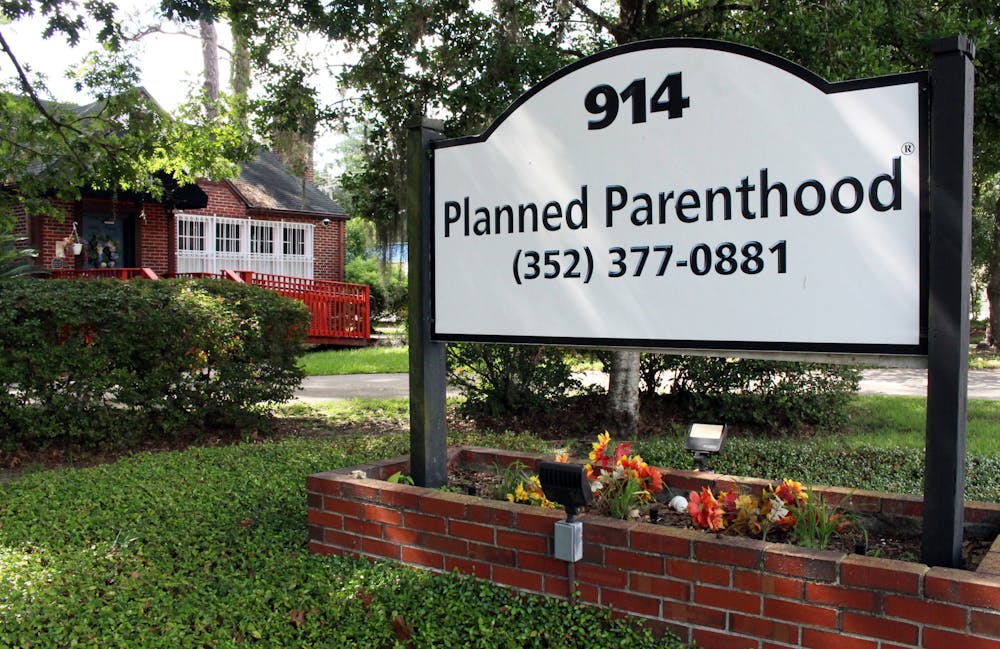Sophia Scribani said she grew up with little understanding of sexual health, a taboo topic in her hometown.
Scribani, a 21-year-old UF health science senior, said she began learning about “the actual barriers that women have to face when they’re trying to get reproductive health care” during her freshman year at UF, when she joined Planned Parenthood Generation Action.
She quickly became passionate about the topic, she said.
Planned Parenthood Generation Action is a UF student-run club affiliated with Planned Parenthood. The club provides sexual health resources and education while advocating for reproductive justice through lobbying local and state legislators.
In Florida, where laws and lingering stigma can make conversations about sex feel like contraband, college comes with enough surprises — finding sexual health care shouldn’t be one of them. Here’s where to go, what to know and who’s got your back at UF and in Gainesville.
Florida reproductive laws
The Supreme Court overturned the 1973 Roe v. Wade decision, which had established a constitutional right to abortion. Its overturn left decisions on abortion access in the hands of state legislatures.
Florida is one of the most restrictive states for birth control access.
Senate Bill 300 dictates abortions can’t be given six weeks after the first day of a person’s last menstrual period. The law is officially known as the “Heartbeat Protection Act” because a fetal heartbeat is detectable around six weeks of pregnancy.
Victims of rape or incest are permitted to receive abortions up to 15 weeks after pregnancy. However, the extension is only provided if the person’s documentation includes a restraining order or police report.
Those wishing to receive an abortion will need to attend two state-mandated in-person doctor appointments. The state also requires a 24-hour waiting period between the two appointments.
The waiting period and six-week laws apply to both surgical and medication abortions.
For a minor to get an abortion in Florida, they need consent from their parents unless it’s a medical emergency, or the minor has been court-emancipated, is married or a victim of sexual abuse.
For those pregnant beyond six weeks, the National Abortion Federation has a phone hotline for information about the nearest abortion center.
There are no state restrictions for traveling out of state to receive abortion care.
The Food and Drug Administration approved the first over-the-counter birth control option in 2023. The pill, called Opill, is sold without a prescription at drug stores, convenience stores and grocery stores. A monthly supply costs $20.
On-campus resources
Students can find menstrual products, such as tampons and period pads, for free in select women’s bathrooms on UF campus.
The on-campus Student Health Care Center offers sexual health services. Students can receive counseling on anything related to sex from the clinic’s medical professionals.
The health care center also includes a Gynecology and Sexual Health Clinic, staffed by gynecological health specialists and advanced practice registered nurses.
The health care center also hosts the Get Yourself Tested clinic, which works with the Alachua County Health Department to offer STI tests, including gonorrhea, chlamydia, syphilis and HIV, for UF students. All appointments incur a $15 lab handling fee, which posts “directly to the student’s UF account,” according to the website.
Appointments are limited, and students who want to be seen by the clinic should call to book an appointment, according to its website.
Planned Parenthood Generation Action’s goal is to make people comfortable talking about sex through general body meetings and outreach events, Sophia Scribani said.
“It’s about community efforts,” Scribani said. “It’s about peers helping each other out … wanting everyone to live their best life and exercise their reproductive autonomy.”
The club hosted a “condom crawl,” an outreach event aiming to promote safe sex.
In an effort to destigmatize sex, Scribani dressed up in a condom costume and handed out bags of condoms, she said.
“Humor goes a long way in communicating the message,” Scribani said. “If you see something funny, you let your guard down, and you’re more open to receiving new information, like ways to deconstruct shame around sex and shame about trying to access reproductive health care.”
Amanda Hiatt, a 21-year-old UF political science and women’s studies senior, is the current PPGA president.
The club began handing out “brown bags” in 2024, which include gifts of Plan B, condoms and pregnancy tests. Since then, Hiatt said the club has distributed over 600 bags.
Plan B is levonorgestrel, a hormone used in birth control. It’s one of many pills people can take to lower their chance of getting pregnant by 75% to 89% if taken within 3 days after unprotected sex.
Hiatt said Planned Parenthood is a resource for everyone.
“It’s not just a service [for] people facing pregnancy,” Hiatt said. “Truly, there is something that we can do for everybody.”
Planned Parenthood offers services like STD testing and treatment, vaccines, mental health services and gender-affirming care, according to its website.
To Hiatt, the organization offers community, support and assistance to those who need it.
“Trying to mitigate the fear of everything happening in the world right now, being in this chapter has really helped me with that,” Hiatt said.
GatorWell Health Promotion Services, a UF department for students, offers education and outreach on health and wellness topics, including sex, sexual anatomy and physiology, and pregnancy prevention through presentations and workshops.
It also offers free barrier methods, including male and female condoms, lube and free HIV testing and counseling through a partnership with the Alachua County Health Department. Since GatorWell is not a clinical office, it doesn’t offer blood-based testing.
The Alachua County Health Department offers services for HIV and AIDs. The department has a clinic providing an HIV prevention medication called pre-exposure prophylaxis, otherwise known as PrEP.
Samantha Evans, a GatorWell employee of 19 years, is currently the assistant director. As a graduate student, she held an outreach position with Planned
Parenthood and was initially hired at GatorWell as a health promotion specialist.
GatorWell’s prevention and health promotion is called a primary prevention practice, she said. It works on the “front end” concerns by promoting sexual health education and safe sex practices to prevent STIs.
“There’s no such thing as a dumb question,” Evans said. “It’s OK to ask questions about things like this, and there’s often a lot of stigma, but if you don’t ask, you don’t know.”
On-campus resources like GatorWell host events aiming to make people feel more comfortable about taboo topics like sex, she said, offering an empowering space to talk and ask questions.
The events help people make the “most informed and most responsible and best decisions for themselves,” Evans said.
The UF Counseling and Wellness Center provides student mental health services with the goal of mental well-being. Its counseling services range from individual and group sessions to couples therapy. It also leads workshops and outreach.
The center also has a 24/7 crisis support line students can call in case of emergency. Distressing situations, including recent sexual assault, are categorized as emergencies.
If a sexual assault needs to be reported, UF’s Title IX Compliance Office, in alignment with federal laws, allows students and faculty to report and resolve incidents of discrimination based on sex or disability or assault.
The Office of Victim Services provides support services to victims of crimes like rape or stalking, including emotional support and assistance filing a police report. All services are free and confidential, according to its website.
The Alachua County Victim Services and Rape Crisis Center is another hotline someone who has experienced sexual violence can call to receive support.
Off-campus resources
Planned Parenthood’s Gainesville Health Center is a small building off Northwest 13th Street.
The center provides sexual health services, including birth control and STI testing and treatment. The center doesn’t provide abortion services.
Planned Parenthood accepts multiple insurances for payments and also has affordable coverage plans for those who are not covered by insurance.
“We will never turn you away if you can’t pay,” its website reads.
Appointments can be booked online or made by phone. Walk-ins are also accepted, according to its website.
Bread and Roses Women’s Health Center is a Gainesville women-owned health care clinic. The clinic offers Plan B for $10 and free pregnancy tests, which are accurate about 10 to 14 days after conception. Florida’s Agency for Health Care Administration licenses the clinic.
According to Bread and Roses’ website, it offers “surgical and medication abortions up to 6 weeks from the last menstrual period.”
Surgical abortions take place within the clinic’s office and take five to 15 minutes. Medication abortions are taken through two pills, which are given at two appointments. Costs vary, but first appointments are $250, according to its website.
Bread and Roses appointments can be scheduled by phone.
Contact Alanna Robbert at arobbert@alligator.org. Follow her on X @alannafitzr.

Alanna is a journalism senior and the Fall 2025 data reporter for The Alligator's Enterprise desk. She was previously a general assignment reporter for metro. Outside of reporting, she is found either with a book, in the gym or with friends playing pool.






